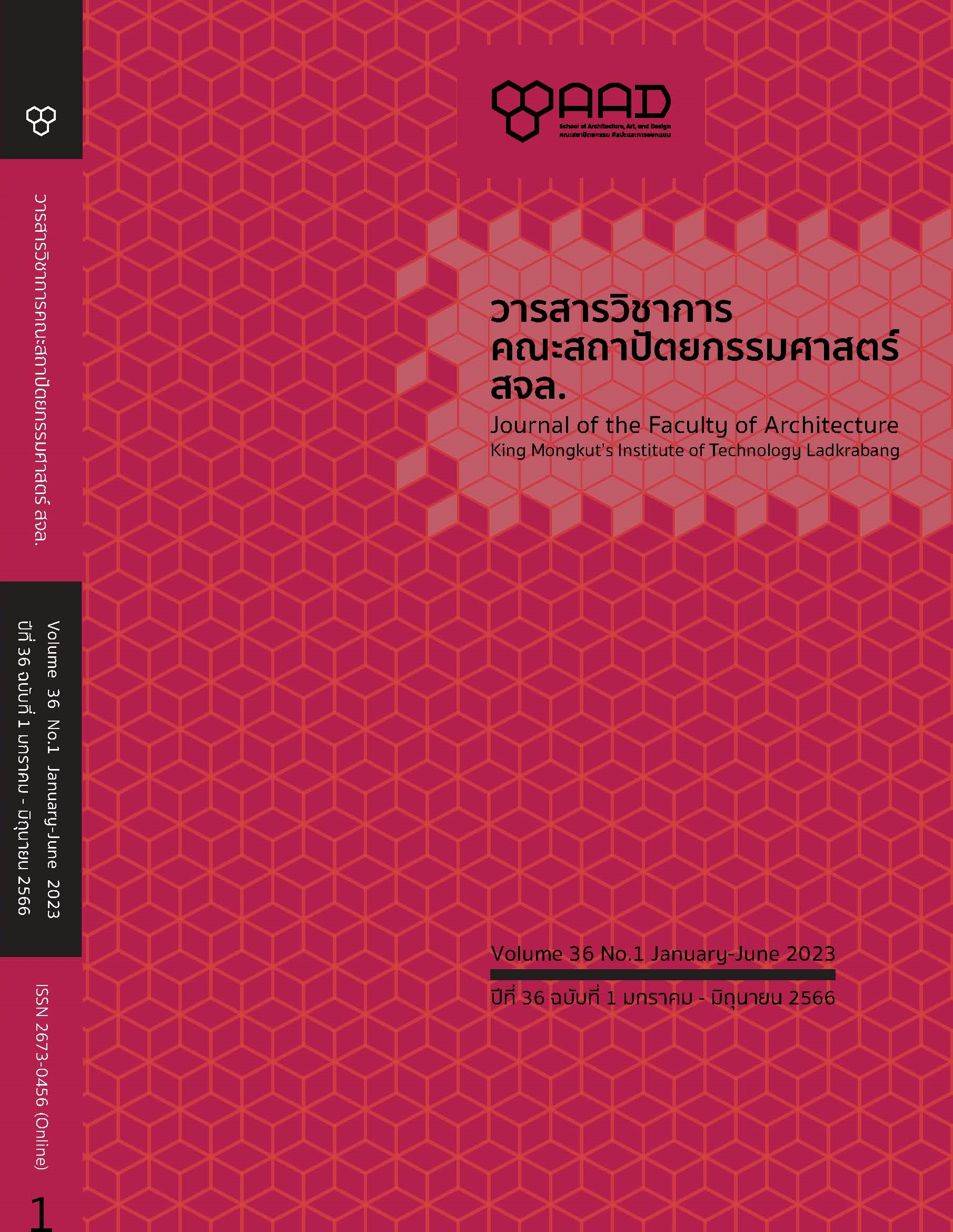Curriculum Evaluation on Landscape Architecture Program, King Mongkut’s Institute of Technology Ladkrabang
Main Article Content
Abstract
This research aimed to evaluate the Bachelor of Landscape Architecture curriculum, King Mongkut’s Institute of Technology Ladkrabang based on the CIPP Model focus on context, input, process, and product evaluation. The samples were selected by purposive sampling from the graduates and senior students in the academic year 2020. A questionnaire has been used for data collection. Frequency, percentage, mean, standard deviation, and content analysis were the statistical tool for data analysis.
The research findings were: The Bachelor of Landscape Architecture curriculum was overall highly appropriate (mean = 4.01). The philosophy of the curriculum was apparently consistent with the objectives of the curriculum. The objectives of the curriculum were paralleled with the social changes and needs. The number of credits of the curriculum structure were highly appropriate. The number of the credits of the teaching-learning arrangement in each subject of the curriculum were highly appropriate. The teaching staffs’ competencies and the teaching-learning arrangement were evaluated at the highest level. The measurement and evaluation and the promotion and development of student characteristics were highly appropriate. The sufficiency of the learning support facilities was moderately appropriate. The learning achievement of the graduates and senior students were evaluated at high level (3.21). 87.09% of graduates is in a good level. The curriculum assessment results in each aspect have been considered and used in the development and improvement process of 2020 edition of the curriculum. This current curriculum, keeping the same core structure and philosophy as the previous one, has added the improvement of the efficiency of teaching and learning management, the development of the teachers and learning support facilities. It also has the new arrangement of the course credit and more specific and elective subjects in order to create the objectively appropriate study plan and curriculum. In this regard, the multi-stakeholders opinions had been gathered through hearing both in part of the course structure and quality of graduates and taken into account for the improvement of the curriculum as well.
Article Details

This work is licensed under a Creative Commons Attribution-NonCommercial-NoDerivatives 4.0 International License.
This work is licensed under a Creative Commons Attribution-NonCommercial-ShareAlike 4.0 International License.
Copyright Transfer Statement
The copyright of this article is transferred to Journal of The Faculty of Architecture King Mongkut's Institute of Technology Ladkrabang with effect if and when the article is accepted for publication. The copyright transfer covers the exclusive right to reproduce and distribute the article, including reprints, translations, photographic reproductions, electronic form (offline, online) or any other reproductions of similar nature.
The author warrants that this contribution is original and that he/she has full power to make this grant. The author signs for and accepts responsibility for releasing this material on behalf of any and all co-authors.
References
กาญจนา คุณารักษ์. (2527). หลักสูตรและการพัฒนา. นครปฐม: คณะศึกษาศาสตร์มหาวิทยาลัย ศิลปากร.
ขนิษฐา บุญภักดี. (2552). การศึกษาปัจจัยที่มีผลต่อผลสัมฤทธิ์ทางการศึกษาของนักศึกษา ระดับปริญญาตรี คณะครุศาสตร์อุตสาหกรรมและเทคโนโลยี มหาวิทยาลัย เทคโนโลยีพระจอมเกล้าธนบุรี. (วิทยานิพนธ์ครุศาสตร์อุตสาหกรรมมหาบัณฑิต สาขาวิชาครุศาสตร์เทคโนโลยี, คณะครุศาสตร์อุตสาหกรรมและเทคโนโลยี มหาวิทยาลัยเทคโนโลยีพระจอมเกล้าธนบุรี).
คณะกรรมการประกันคุณภาพภายในระดับอุดมศึกษา. (2558). คู่มือการประกันคุณภาพการศึกษาภายในระดับอุดมศึกษา พ.ศ. 2557. พิมพ์ครั้งที่ 1. กรุงเทพมหานคร: สำนักงานคณะกรรมการอุดมศึกษา กระทรวงศึกษาธิการ.
ใจทิพย์ เชื้อรัตนพงษ์. (2539). การพัฒนาหลักสูตร : หลักการและแนวปฏิบัติ. กรุงเทพฯ: โรงพิมพิม์อลีน เพรส.
ชมพันธุ์ กุญชร ณ อยุธยา. (2540). การพัฒนาหลักสูตร. กรุงเทพฯ: ข่าวทหารอากาศ.
ทรงสิริ วิชิรานนท์, ภาวิณี อุ่นวัฒนา, พัลลพ หามะลิ และชัยวุฒิ ชัยฤกษ์. (2560). ความพึงพอใจต่อหลักสูตรศิลปศาสตรบัณฑิต มหาวิทยาลัยเทคโนโลยีราชมงคลพระนคร. ในการประชุมวิชาการมหาวิทยาลัยเทคโนโลยีราชมงคล ครั้งที่ 9 (9th RMUTNC) และการประชุมวิชาการนานาชาติมหาวิทยาลัยเทคโนโลยีราชมงคล ครั้งที่ 8 (8th RMUTIC). (หน้า 65-71). กรุงเทพฯ.
ธนภณ พันธเสน และนวลวรรณ ทวยเจริญ. (2563). การพัฒนาหลักสูตรวิทยาศาสตรบัณฑิต สาขาวิชาสถาปัตยกรรมคณะสถาปัตยกรรมศาสตร์มหาวิทยาลัยเกษตรศาสตร์ เพื่อส่งเสริมการสร้างสรรค์นวัตกรรมอาคารเขียว. วารสารครุศาสตร์อุตสาหกรรม. 19(3), 99-110
ธํารง บัวศรี. (2532). ทฤษฎีหลักสูตรการออกแบบและการพัฒนา. กรุงเทพฯ: โรงพิมพ์คุรุสภา ลาดพร้าว.
บุญชม ศรีสะอาด. (2546). การพัฒนาหลักสูตรและการวิจัยเกี่ยวกับหลักสูตร. กรุงเทพฯ: สุวีริยาสาส์น.
บุญธรรม กิจปรีดาบริสุทธิ์. (2540). ระเบียบวิธีการวิจัยทางสังคมศาสตร์. พิมพ์ครั้งที่ 7. กรุงเทพฯ: โรงพิมพ์และทำปกเจริญผล.
วิชัย วงษ์ใหญ่. (2525). กระบวนการพัฒนาหลักสูตรและการเรียนการสอน. กรุงเทพฯ: ธเนศวรการพิมพ์.
วิชัย วงษ์ใหญ่. (2530). การพัฒนาหลักสูตรครบวงจร. วารสารการวิจัยทางการศึกษา. 17(7), หน้า 62-80
วรญา ทองอุ่น และจันจิราภรณ์ ปานยินดี. (2560). ความพึงพอใจต่อหลักสูตรการบริหารทรัพยากรมนุษย์คณะวิทยาการ จัดการมหาวิทยาลัยราชภัฏนครปฐม. วารสาร มจร. พุทธปัญญาปริทรรศน์. 2(1), 1-12.
ศิริชัย กาญจนวาสี. (2545). ทฤษฎีการประเมิน. พิมพ์ครั้งที่ 3. กรุงเทพฯ: สำนักพิมพ์จุฬาลงกรณ์มหาวิทยาลัย
ศิริพร พูนชัย, บุศย์รินทร์ อารยะธนิตกุล, อมราภรณ์ หมีปาน, อภิญญา อินทรรัตน์, พัชราภรณ์ อุ่นเตจ๊ะ, อายุพร ประสิทธิเวชชากูร และสรินทร เชี่ยวโสธร. (2562). การประเมินหลักสูตรพยาบาลศาสตรบัณฑิต (หลักสูตรปรับปรุง พ.ศ. ๒๕๕๕) ของวิทยาลัยพยาบาลกองทัพบก. วารสารพยาบาลทหารบก. 20(2), 380-389.
สำนักมาตรฐานและประเมินผลอุดมศึกษา กระทรวงศึกษาธิการ. (2560). เกณฑ์มาตรฐานหลักสูตรระดับอุดมศึกษา พ.ศ. 2558 และเกณฑ์มาตรฐานที่เกี่ยวข้อง. พิมพ์ครั้งที่ 1. กรุงเทพ: บริษัท วงศ์สว่างพับลิชชิ่ง แอนด์ พริ้นติ้ง จำกัด.
สุบิน ปิ่นขยัน. (2530). การปรับปรุงหลักสูตรอุดมศึกษาให้สอดคล้องกับสภาพปัญหาและความต้องการของชุมชน. อุดมศึกษา. 2530(กุมภาพันธ์), 3-7.
สุวิชัย อินทกุล และพระครูอุปกิตปริยัติโสภณ. (2563). ความพึงพอใจของนิสิตที่มีต่อการเรียนการสอนของมหาวิทยาลัยมหาจุฬาลงกรณราชวิทยาลัย วิทยาลัยสงฆ์อุทัยธานี. วารสารบัณฑิตศึกษาปริทรรศน์ วิทยาลัยสงฆ์นครสวรรค์. 8(1), 163-180.
อิสรีย์ โชว์วิวัฒนา. (2556). ความพึงพอใจของนักศึกษาที่มีต่อหลักสูตรปริญญาตรี คณะบัญชีมหาวิทยาลัยหอการค้าไทย. วารสารวิชาการ มหาวิทยาลัยหอการค้าไทย. 33(ฉบับพิเศษ), 1-12.
Cohen, L. and Manion, L. (1989). Research Method in Education. 3rd ed. London: Routledge.
Stake, R.E. (1967). The Countenance of Educational Evaluation. Teachers College Record. 68, 523-540.
Stufflebeam, D.L., et al. (1971). Educational Evaluation and Decision. Making. Itasca, Illinois: Peacock Publishing.
Stufflebeam, D.L. (1971). The Relevance of the CIPP Evaluation Model for Educational Accountability. Journal of Research and Development in Education. 5, 19-25.
Saylor, J.G., W. Alexander and A. J. Lewis. (1981). Curriculum Planning for Better Teaching and Learning, New York: Holt, Rinehart and Winston.
Tyler, R.W. (1950). Basic Principles of Curriculum and Instruction. Chicago: University of Chicago Press.
Tyler, R. W. (1986). The Five Most Significant Curriculum Events in the Twentieth Century. Educational Leadership, 44, 36-38.


